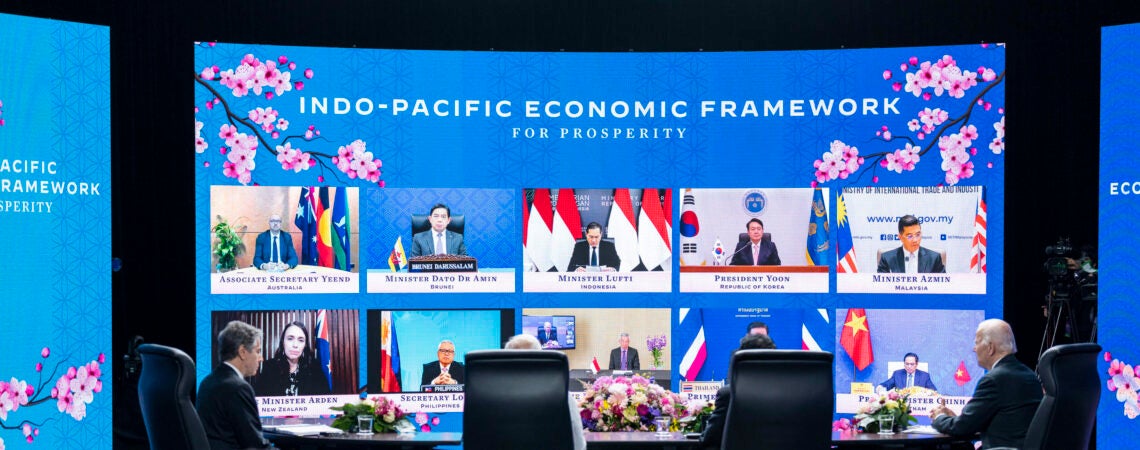In recent years, supply chain disruptions have become commonplace, resulting in governments and businesses rethinking long-held strategies, such as “cost and efficiency,” “just-in-time,” and “offshoring.” Facing shortages of products ranging from personal protective equipment (PPE) to automotive semiconductors, governments have had to mobilize quickly to deal with crises, often cobbling together a series of temporary and ad hoc measures. However, it has become clear that no country can prevent or cope with these disruptions alone. A collective approach, especially among like-minded countries, can greatly enhance supply chain resiliency and security.
The Indo-Pacific Economic Framework (IPEF) is one of the most promising international economic negotiations for addressing supply chain issues. Launched by the Biden administration in May 2022, IPEF is a blueprint for U.S. economic engagement in the region with 14 partners representing 40% of global GDP. Of its four pillars, the Supply Chain Pillar has attracted considerable attention. In many ways, this area is a clean slate, paving the way for creative thinking on rules and cooperation mechanisms to minimize disruptions.
IPEF negotiators are making meaningful on their supply chain work, with early harvest agreements possibly being announced in late May this year, around the time of the APEC Ministers Responsible for Trade (MRT) meeting in Detroit, Michigan. With this in mind, we recommend a series of proposals to strengthen and expand the work of IPEF, both on a sector-wide basis and on critical minerals and materials, which could serve as a pilot for work in other sectors.
We recommend important elements that should be included in an “early warning system” and “crisis response mechanism” to make these tools as robust and impactful as possible. We also suggest that IPEF members agree to World Trade Organization plus rules to deter the imposition of export restrictions and facilitate customs processing and essential cross-border movement of products and people during times of supply chain shortage. Finally, we underscore the benefits of supply chain connectivity and co-investment opportunities that can be generated through work in this pillar, especially for the developing country members of IPEF.
Regarding critical minerals and materials, we offer several recommendations to cooperate on supply chain mapping, as well as streamlining and harmonizing regulations and standards. Furthermore, we suggest developing a “swap system” to be drawn from the financial “currency swap” mechanisms as a collective response that encourages countries to share their stockpiles during times of severe supply crises. Finally, we propose that Washington negotiate critical minerals and materials agreements similar to the one recently signed with Japan to make other IPEF members eligible for electric vehicle tax credits under the Inflation Reduction Act.
Our recommended policy proposals will take time to implement and could be taken up in phases. For 2023, we propose focusing on sector-wide outcomes and starting work on critical minerals and materials, which could continue into 2024. Next year would also be an opportune time to build on the cooperation mechanisms to make them more beneficial and relevant. It may also be worthwhile to consider a market access component to this effort. The IPEF Supply Chain Pillar provides a promising opportunity for the United States and its regional partners to set a new course in reshaping more resilient and secure supply chain networks.
Han-Koo Yeo is a non-resident Distinguished Fellow at the Asia Society Policy Institute (ASPI). Prior to joining ASPI, he capped off almost three decades of public service as Trade Minister of the Republic of Korea.
Wendy Cutler is Vice President of the Asia Society Policy Institute (ASPI) and Managing Director of the Washington D.C. Office. She joined ASPI after nearly three decades as a negotiator in the Office of the U.S. Trade Representative.
ASPI_RegSupplyChain_issuepaper_finalize
To read the full issue paper, please click here.

